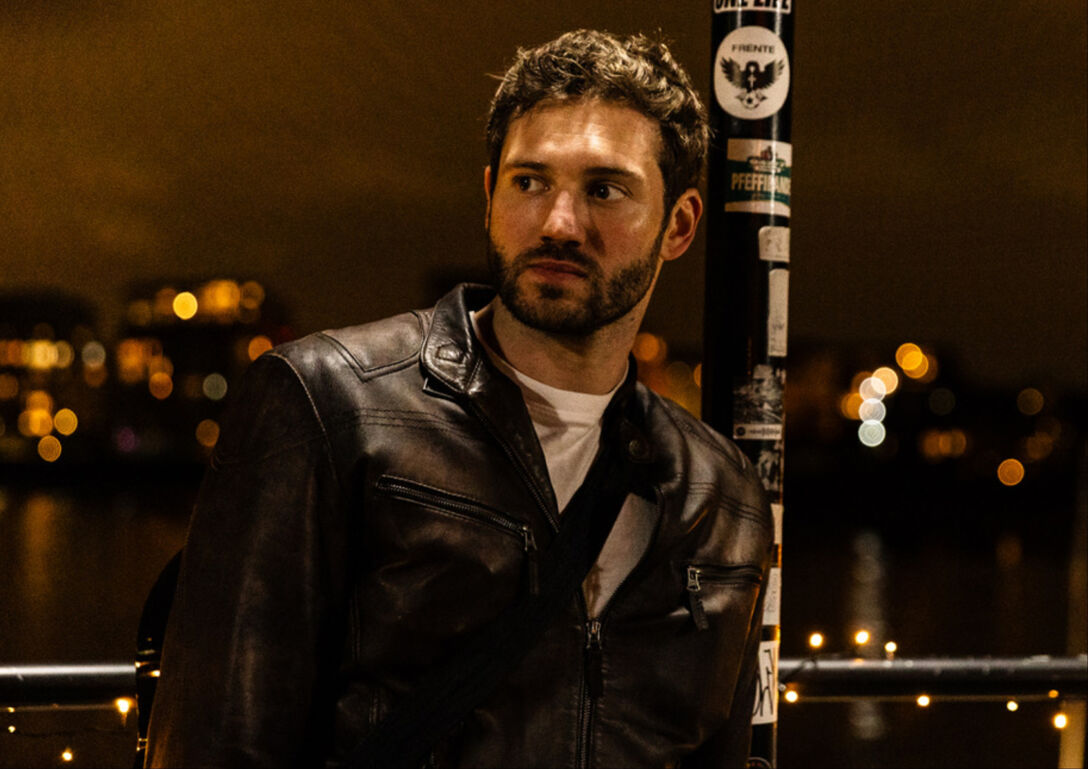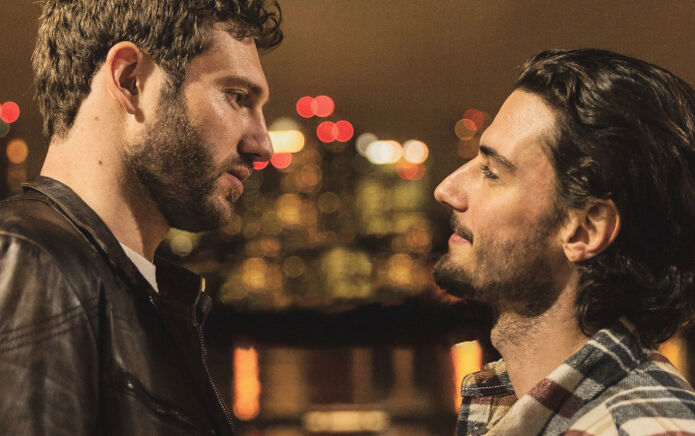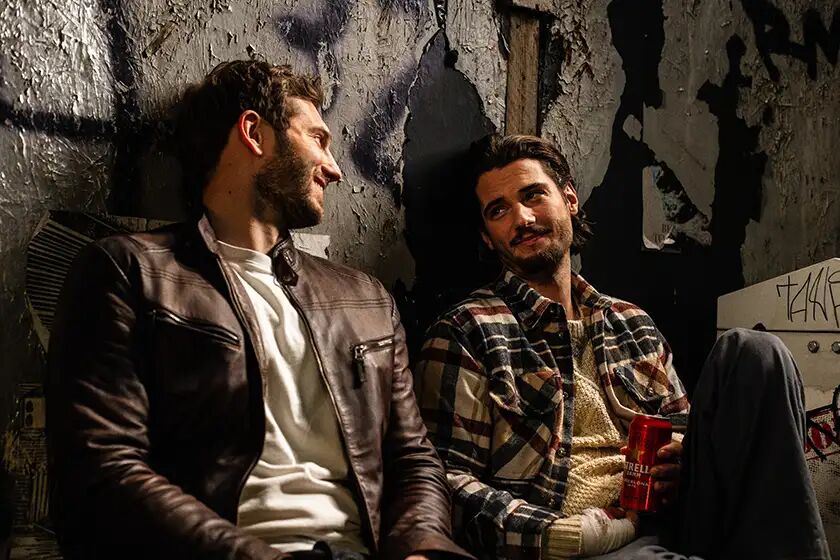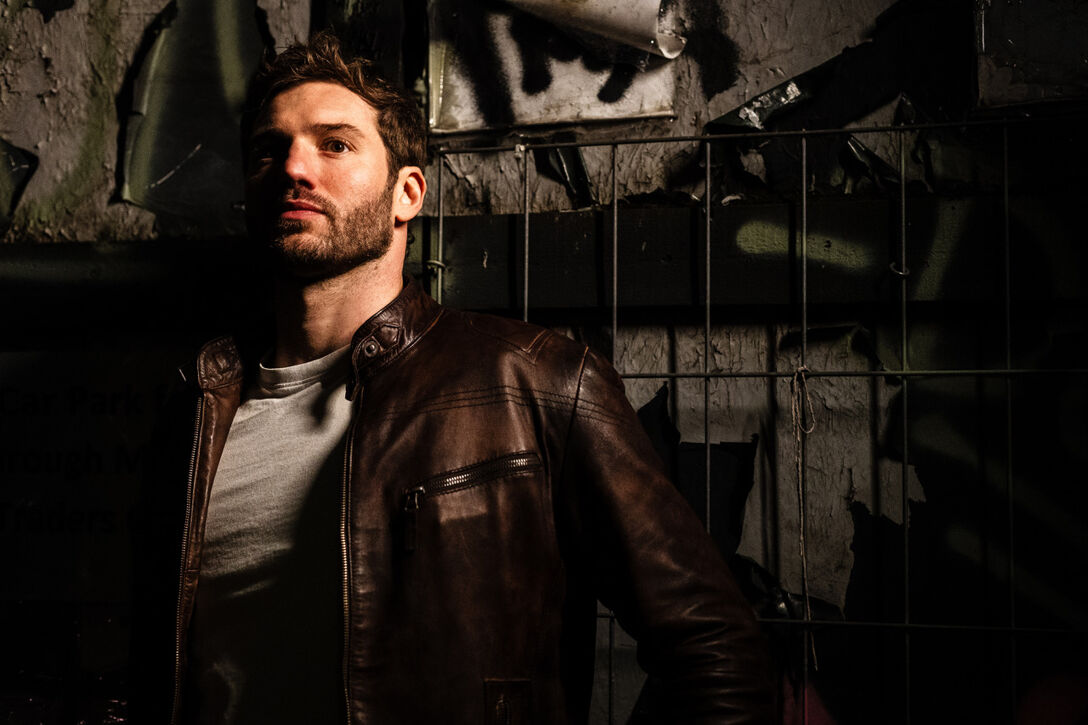Alexander Lincoln dishes on A Night Like This, his dream date night & why he’s “terrified” of rugby now
From British soap 'Emmerdale' to rugby drama 'In Form The Side,' the rising star gets another showcase in the romantic, queer 'A Night Like This.'


If you’ve ever wanted to spend the night with Alexander Lincoln, well now you can thanks to the indie romantic drama A Night Like This!
In the Liam Calvert-directed film, Lincoln plays a so-called “privileged bonehead” named Oliver who has a chance encounter at a London pub with Lukas (The Great‘s Jack Brett Anderson), a struggling German actor at the end of his rope. Both restless and aimless, the newly acquainted pair makes a bet to spend the rest of the night together, going wherever the city and their blossoming connection takes them.
How about we take this to the next level?
Subscribe to our newsletter for a refreshing cocktail (or mocktail) of LGBTQ+ entertainment and pop culture, served up with a side of eye-candy.
Subscribe to our Newsletter today
For Lincoln—who has previously come out as “not straight,” but otherwise would rather avoid labels—playing Oliver presented an opportunity to inhabit a character who is similarly open to new people, new experiences, and new connections. And in that sense, A Night Like This offers a unique view romance in that, even as its leads let their guards down and find themselves becoming emotionally intimate with one another, their end game isn’t necessarily romantic. Although it could be…
The film is yet another fabulous showcase for the 31-year-old actor who, after a breakthrough on the British soap Emmerdale, became a favorite of international queer audiences with the gay rugby drama In From The Side, a role which called on his own experiences playing rugby growing up. Since then, Lincoln’s career hasn’t let its foot off the gas, including The Groomsmen trilogy with Jonathan Bennet, which featured the Hallmark Channel’s first gay wedding storyline.
After a successful film festival run, A Night Like This is now playing in .K cinemas (a US release should hopefully be announced soon), so we thought it was the perfect time to invite Lincoln to the hot seat for our long-running Q&A series, Dishin’ It. In our conversation, the actor opens up about the “out of pocket’ queer film that spoke to him at a young age, building chemistry with co-star Jack Brett Anderson, and whether or not he still has what it takes to hit the pitch for a friendly rugby match.
Is there a piece of media—whether a movie, TV series, book, album, theater, video game, etc…—that has played an important role in your understanding of queerness and the queer community, or your own identity? Why does it stand out to you?
I love this question. I’ve said this before, but I hate the labels, and my own journey of sexuality was never—at least when I was growing up, you never saw many people who were out but who were sort of ambiguous in terms of what they wanted or what they were into. So in terms of figures, there was never really any one person that I felt akin to.
This is so out of pocket, but this is a very much a queer film, though the themes of it are quite crazy, and it’s a film called Mysterious Skin with Joseph Gordon-Levitt when he was really young. And the premise is not something that “helped me” as such, but seeing Joseph Gordon-Levitt in that role as this young kid who, through trauma, he got to where he was. But there was just that sense of worldliness that he had, and I think, obviously, being massively attracted to him was a huge part of that. [Laughs.] I remember I found it in a random shop, the DVD, and it just struck me, so I took it home, I watched it. I think these queer characters—who were so complex and had gone through such a tumultuous childhood—just spoke to me.
And I know people would say that’s a crazy film to have an awakening of some kind, but it wasn’t an awakening so much as it was I hadn’t seen characters depicted in that way, in my understanding of what queerness was. I just find the characters so overwhelmingly interesting and beautiful, even in the wake of all this trauma. But, for me, that’s the film that first made me a little bit more acquainted with the world that I felt like I was more akin to. And I don’t want to get misrepresented in terms of anything that happened in the movie, or that I’m making light of it in any way, but it just was a film that really spoke to me. It’s incredible.
In A Night Like This you play Oliver, who for all intents and purposes when we first meet him in this story, is straight. What intrigued you most about playing a character at this point in their life? Do you feel like you have similarities to Oliver?
I think there’s always an element of you seeing yourself in a character you play, or relating in some way. With Oliver, he’s so lost and broken, and it’s interesting because he’s someone from that background where you’ve got a lot of money, or your parents have, and you’ve probably got the trust fund—that safety net from people. But what I saw in Oliver was that really, generally speaking, no matter the background, we all feel the same emotions. We all feel the same anguish and guilt and shame, all of it. And I feel like we live in a world now where it’s like, “if you’re from this area, that’s what you know, so you can’t speak to this.” But I think the emotions that the human experience elicit are very much the same no matter what.
As for Oliver’s sexuality, he presumably comes from a private education, and from what I’ve heard from people that I have met when I was doing research, there is a little, I guess, homeotic tendencies, on occasion. I mean, especially at boarding school. It’s similar to that sort of boyish thing in the changing rooms of a sports team or whatever. Not that everyone does that, but it does happen, you know? And for Oliver, he’s never really put labels on it, at least in my depiction of him. He’s never been in a relationship with a man, but there’s definitely been experiences that he’s had, though he would never label himself and that’s what’s beautiful about him: that it doesn’t matter to him. It’s very much about the connection and the person that he’s meeting.
And I think that’s a really beautiful aspect of the film in general, because it’s more about that connection with this total stranger. And when does that happen unless there is a sexual component to it? I mean, how often do you meet a total stranger and spend an entire night with them where that isn’t a part of the transaction, you know? And I think that’s what drew me to the script: it’s this really beautiful story of these two very broken people from very different walks of life who see something in each other, and almost become each other’s therapists, to a degree. And they allow each other to say the stupid, cosmic things that all of us think. I mean, so much of myself is in Oliver in that way, because I hate small talk, and I will often talk about, like, life and death and all that kind of crazy stuff. And it can be off putting to people, I’m sure, but I love it!

The film has been described as a “platonic rom-com”—what does that mean to you? What makes a good romantic film in your opinion, and how does that apply to this film?
So, the platonic aspect is really interesting, because it is and it isn’t! Oliver isn’t necessarily seeing this as a romantic thing from the start, but you do see this intimacy which grows throughout the night. And so “platonic” is an interesting word to use. I don’t know if I would necessarily call it platonic in the way that there is a lacking of romance at the start, and it’s about two people sort of connecting. But there’s also a degree of intimacy with that, a beautiful sense of no-strings-attached.
And we we weren’t seeing it as a rom-com in the traditional sort of sense. I mean, there is a huge amount of comedy in there at points, especially with my character being sort of a devil-may-care coke fiend, and a bit of a bonehead at times. But the thing I would say it’s akin to, I suppose, is more of Before Sunrise or Before Sunset, even though those have got more of a romantic overtone to them where you want this couple to really make it work. And I think you do with Lucas and Oliver, too, but there’s also this idea at the end where it could be that they just become friends. And there’s a really beautiful intimacy of friendship, which you don’t see depicted that often either.
You and Jack Brett Anderson have an incredible on-screen chemistry. What did you like about working with him? What were some things you two bonded over, or discussed on set between takes?
Well, Diego [Sceratti, writer & producer] was very, very up for us meeting and rehearsing a lot of the scenes beforehand. So we did rehearse quite a bit of it just sort in Diego’s flat where we worked on what we were doing and where we were coming from and stuff. And there was actually quite a lot of rehearsal time for an indie film, so it was really lovely, and I’m so happy that Liam and Diego gave us that time to do that. I mean, it’s so much centered upon two people and their dynamics, so it was great to have that. And we spoke about who these people were in such detail that, I feel like when we got to actually to filming it, we were able just to play in such a way that was really beautiful.
And Jack’s wonderful—I hadn’t met him before, before we did the chemistry read and, but we get on so well and it was very easy to start. With the rehearsal that we had, when we got there on the day, it was almost innate, and we were just fully there with the characters. It was a genuinely wonderful shoot—a freezing cold shoot, but a really, really wonderful one all the same.

Inspired by the film, describe your ideal romantic night—platonic or otherwise—in London.
I mean, Soho is always a good night out, there’s so many places to go, and the vibes are just, like, anywhere you go, there’s basically always something on. But actually, I really like Clapham! There’s a place—and I don’t go that much anymore, but we shot there a little bit for In From The Side, and had our wrap party there, and it’s this place called Two Brewers. It’s quite a small venue, but it’s just so much fun.
Though I think, for me, my ideal night is dinner, usually pizza—because who doesn’t love pizza? And then also, there’s a really nice place in Soho, which does a slice and frozen margaritas, which is just amazing. So that, then a theater show, or cinema, and then probably a night out dancing. I love a good dance! The more ridiculous, the better.
I think a lot of the Queerty readership first got to know you through In From The Side, a movie we love. I know you used to play rugby back in the day, but did you find it easy to pick back up for the role? Was any part of it harder than you remember? What was the training like?
Yeah, you know, I played for years; I played until I was about 18. And I loved it, it was such a transformative part of my childhood. Because even when I lived in the UAE, Abu Dhabi, when I was a child, I played there, and that’s extremely rare because hey did have a team, so there weren’t many people playing it. It’s such a huge part of me, and so when we were doing the training and all of that kind of stuff, it was a bit old hat—like, it just came back!
And I’d love to say that I picked it up and started playing again, but honestly, I’m terrified of breaking any bones. I mean, I broke so many bones when I was playing—mainly my nose—and as an actor, having a broken nose every five every weeks probably would not be that conducive to auditioning, nor filming. A few of my friends actually play a bit of tag rugby, which only really works in in the summer, because in the winter, obviously it’s rainy and muddy. So I’d really like to start actually playing again. Matt [Carter,] the writer and director, he coaches a team in Brighton, and he’s invited me down to trainings before, but I haven’t gone yet. I don’t actually know why—I guess we just keep missing each other.
But I really would like to, so I might actually get onto him soon and come down for a training session. Because I really do love it, but it’s a very intense sport. You’d have to play tag, I couldn’t play full contact again, largely because I’m actually not very skilled at it, I’m just big. [Laughs.]
And, in closing: Who is an LGBTQ+ artist/performer/creator that you think is doing really cool work right now? Why are they someone we should all be paying attention to?
There are so many people who are doing just incredible, incredible work. But the one that springs to mind does not need any introduction at all—well, maybe it may be in the States? But he’s a name there as well, for sure, and I’ve only just met him recently when we were doing This Bitter Earth, the play in Soho. But he’s constantly and consistently writing and creating characters which are so beautiful and nuanced, and stories that need to be told. And, again, he does not need any introduction, but it’s Russell T Davies who did It’s A Sin, among many, many other. I just think the way that he writes, the way that he tells stories, is such a beautiful thing. And he tells very British stories as well, which at least in Britain, we need more of. Russell is such a wonderful soul, and I just think he’s incredible, all the work that he’s doing.
A Night Like This is now playing in UK cinemas; stay tuned for US release details.

Related
Alexander Lincoln elaborates on his sexuality two years after coming out as “not straight”
Alexander Lincoln first caught our eyes starring in the gay rugby romance ‘In From The Side.’
Sign up for the Queerty newsletter to stay on top of the hottest stories in LGBTQ+ entertainment, politics, and culture.

 Mark
Mark 





